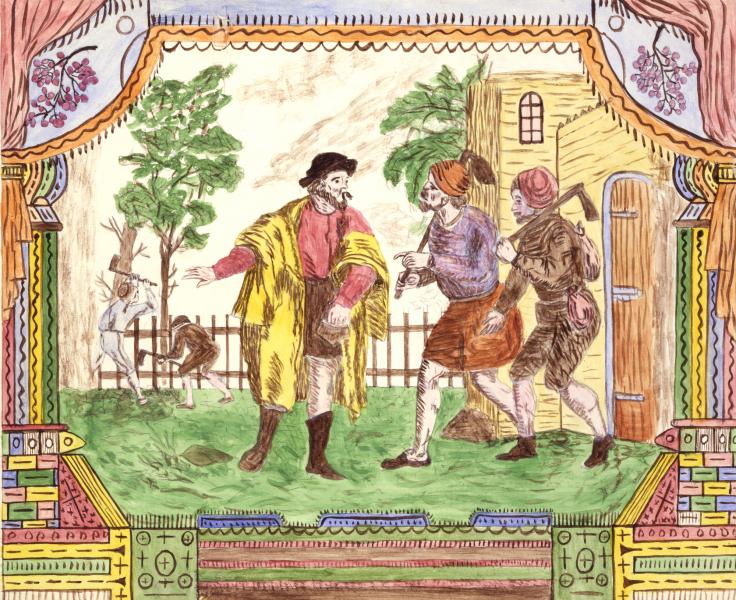The Parable of the Workers in the Vineyard, Lawrence Ladd (c. !880)
Mount Calvary Church
A Roman Catholic Parish
The Personal Ordinariate of S. Peter
Eutaw Street and Madison Avenue
Baltimore, Maryland
Rev. Albert Scharbach, Pastor
Andrew Johnson, Organist and Music Director
Trinity XV
September 20, 2020
8:00 A.M. Said Mass
10:00 A.M. Sung Mass
This mass will be live streamed.
___________________
Organ Prelude
Sonata VI: Andante, Felix Mendelssohn (1809-1847)
This morning’s organ prelude is the last movement of Mendelssohn’s sixth and final organ sonata. Rather than ending with a lively, virtuosic finale, the composer closes with this simple, newly-composed chorale in a pastoral style.
Organ Postlude
Immortal, Invisible, God Only Wise, arr. Matt Limbaugh (1949- )
Matt Limbaugh was Organist at First Baptist Church in Mauldin, South Carolina from 1985 to 2015. His setting of “Immortal, Invisible” begins with a festive introduction and march, then transitions into a dance-like meter with the melody played by the feet.
Offertory Anthem
Sicut cervus, G.P. Palestrina (1525-1594)
Sicut cervus desiderat ad fontes aquarum,
ita desiderat anima mea ad te, Deus.
As a hart longs for the flowing streams,
so longs my soul for thee, O God.
Giovanni Pierluigi da Palestrina was the premier composer of sacred music in 16th century Italy. His smooth and refined compositional style emphasizes the intelligibility
of text and remains the model of Renaissance polyphonic writing. In this setting of the first verse of Psalm 42, the composer’s long melodic lines are an outward expression of the scripture’s inward longing for Christ.
Communion anthem
Beati quorum via, C. V. Stanford (1852-1924)
Beati quorum via integra est,
qui ambulant in lege Domini.
Blessed are the undefiled in the way,
who walk in the law of the Lord.
Charles Villiers Stanford was an organist, professor, and composer in the late 19th and early 20th centuries. This anthem is the third of his Three Latin Motets, which sets the first verse of Psalm 119. The composer utilizes several different combinations of the six voice parts, particularly repeating phrases with the higher and lower three voices. The piece is in A-flat major and 3/4 time, marked Con moto tranqillo ma no troppo lento (In calm movement but not too slow).
Hymns
All my hope on God is founded (MICHAEL) is a free translation by Robert Bridges (1844-1930) of “Meine Hoffnung stehet feste” were written around 1680 by Joachim Neander. In 1930, Dr Thomas Percival Fielden, director of music at Charterhouse School, sent Bridges’ text to a friend, composer Herbert Howells, requesting Howells compose a new setting of the hymn for use at the school. Howells received the request by post one morning, in the middle of breakfast. Almost immediately a tune suggested itself to him and the hymn was apparently composed on the spot (in the composer’s words) “while I was chewing bacon and sausage.” Fielden was one of the editors of The Clarendon Hymn Book, and when that book was published in 1936 he chose to include the hymn. Howells’ son Michael had died in childhood the previous year, and in tribute Howells rechristened the tune Michael.
Jesus, priest and victim (KING’S WESTON) has words by the Dominican nuns of Summit. The tune KING’S WESTON is by Ralph Vaughan Williams’ melody, reverently in its somewhat somber manner. It has strong appeal, not least because it features a lovely, mournful folklike quality in the Dorian mode. The short lines of each stanza end in a dotted whole note, emphasizing the rhyme and the meaning.
Immortal, Invisible, God only wise (ST. DENIO) by William Chalmers Smith (1824—1908), is a proclamation of the transcendence of God: “To the King of ages, immortal, invisible, the only God, be honor and glory for ever and ever” (1 Tim 17). No man has ever seen God, who dwells in inaccessible light that is darkness to mortal eyes. God lacks nothing (“nor wanting”) and never changes (“nor wasting”), and is undying, unlike mortals, who in a striking image “blossom and flourish like leaves on the tree, then wither and perish.” The original ending of the hymn completes the thought: “And so let Thy glory, almighty, impart, / Through Christ in His story, Thy Christ to the heart.” “No one has ever seen God; the only Son, who is in the bosom of the Father, He has made Him known” (John 1:18). Only in Jesus through the proclamation of the Gospel can we know the Father. John Roberts, in Welsh Ieuan Gwyllt (1822-1877), composed the tune ST. DENIO. It is derived from a Welsh folk song Can Mlynned i ‘nawr’ (“A Hundred Years from Now”).
